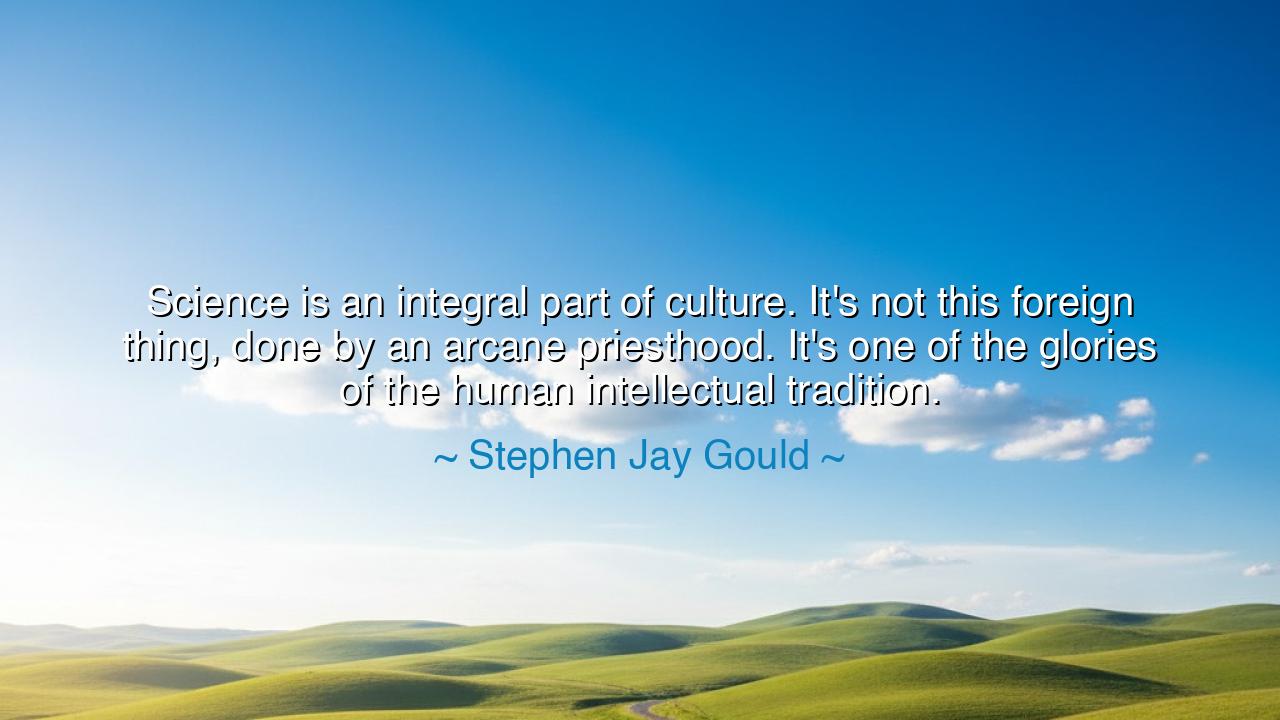
Science is an integral part of culture. It's not this foreign
Science is an integral part of culture. It's not this foreign thing, done by an arcane priesthood. It's one of the glories of the human intellectual tradition.






Hear, O seekers of knowledge, the profound words of Stephen Jay Gould: "Science is an integral part of culture. It's not this foreign thing, done by an arcane priesthood. It's one of the glories of the human intellectual tradition." These words are more than mere reflections; they are a call to recognize the deep and abiding connection between science and the very essence of what it means to be human. For too long, there has been a misconception that science is some distant, esoteric pursuit, locked away in the ivory towers of academia, accessible only to a select few. But Gould shatters this illusion, reminding us that science is not a separate entity—it is woven into the very fabric of our culture, a living testament to humanity's collective pursuit of understanding.
In the days of the ancients, knowledge was not divided into the compartments we see today. The philosophers of Greece, such as Plato and Aristotle, were not only thinkers of philosophy, but also early scientists, deeply engaged in the study of the natural world. Aristotle wrote of the earth, the stars, the sea, and the animals, seeking to understand the forces that shaped the world. These early scientists did not see their work as separate from the larger pursuit of truth that encompassed all of human thought. Science, then, was not a foreign or alien thing; it was the natural extension of humanity's quest to understand the world, the divine, and themselves. To study the natural world was to engage with culture itself.
Yet, as time marched forward, there arose a separation—an idea that science and culture were distinct realms. The rise of specialization in the modern era led to a perception that science was reserved for an elite few, a priesthood of experts whose knowledge could not be easily understood by the common people. This led to the unfortunate divide we see today, where many view science as something to be feared or misunderstood, a mysterious force that operates beyond the reach of everyday life. Gould calls upon us to dismantle this divide, to see science not as a foreign entity but as an integral and vital part of our shared heritage.
Consider the Renaissance, that wondrous age of intellectual rebirth, when Leonardo da Vinci and Michelangelo combined the worlds of art and science, drawing upon the principles of both to create masterpieces that were as much a reflection of the natural world as they were of the human soul. Leonardo, a scientist in his own right, made detailed studies of the human body, the landscape, and the heavens, all while producing works of art that remain timeless. For him, science was not something separate from his identity as an artist; it was the very foundation upon which his creative work was built. This union of science and culture should serve as a model for us all—a reminder that understanding the world is not just the province of the scholar, but of every human being.
Even in more recent times, we see how science continues to be one of the great glories of our intellectual tradition. Think of Isaac Newton, whose work in mathematics and physics laid the groundwork for the scientific revolution. Newton did not see his discoveries as isolated from the rest of human culture. His quest to understand the laws of nature was driven by the same curiosity and wonder that drove the ancient philosophers. His work was, and continues to be, a bridge between the intellectual and the practical, the abstract and the real. Science, in his view, was the key to unlocking the mysteries of the universe, and it was as integral to human culture as any other pursuit.
Thus, the lesson is clear, O seekers of wisdom: science is not a foreign or detached pursuit. It is not the domain of a select few, locked away from the rest of the world. It is a part of culture, woven into the very fabric of our lives. To understand science is to understand the world, and to engage with it is to engage with one of the greatest intellectual traditions of humanity. Whether you are a farmer observing the cycles of the seasons, a doctor healing the sick, or an artist capturing the beauty of the natural world, you are participating in the grand tradition of science—for it is not merely a discipline, but a way of seeing and understanding the world.
Let us, therefore, reclaim science as a universal endeavor, not a mysterious force hidden behind closed doors. Let us embrace it as part of our cultural inheritance, a gift to all humankind, and one that enriches our lives, just as it has done for generations before us. As Gould wisely teaches, science is not a thing apart, but an essential part of the human intellectual tradition. And in embracing it, we come closer to understanding not only the world around us but our place within it. Let this be our path forward—one where science and culture are united in the search for truth, wisdom, and beauty.






AAdministratorAdministrator
Welcome, honored guests. Please leave a comment, we will respond soon